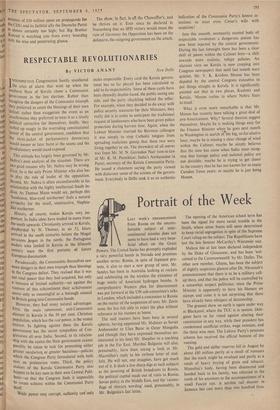RESPECTABLE REVOLUTIONARIES
NTROSPECTIVE Congressmen hastily smothered
T
the cries of alarm that went up when the southern State of Kerala chose a Communist government in the last election. Rather than recognise the dangers of the Communist triumph they preferred to count the blessings of their own defeat; rather than exaggerate the event as an anachronism they preferred to treat it as a timely Political corrective for themselves; finally, they curled up snugly in the overriding constitutional Power of the central government, confident that the strait-jacket of parliamentary democracy Would sooner or later burst at the seams and the revolutionary would stand exposed.
This attitude has largely been governed by Mr. Nehru's own analysis of the situation. There are two good reasons why Mr. Nehru may be wrong. First, he is the only Prime Minister who also has to Play the role of leader of the opposition. Second, Mr. Nehru is often uncomfortable in his relationship with the highly intellectual South In- dian. As Thomas Mann would say, perhaps this handsome, blue-eyed northerner' feels a natural antipathy for the small, unattractive, Naphta- like southerner.
History, of course, makes Kerala very im- portant. In India ideas have tended to move from the south upwards. Christianity arrived in Kerala, shepherded by St. Thomas, in AD 52; Islam arrived in the south centuries before the Mogul Invasions began in the north; the Portuguese traders who landed in Kerala in the fifteenth century were the first portents of future European domination.
Paradoxically, the Communists themselves saw more dangers in their own triumph than blessings In the Congress defeat. They realised that it was not total power that they had acquired, but only a measure of limited authority—set against the vastness of this subcontinent their achievement seems only as meaningful as a borough council In Britain going into Communist hands. However, they had many natural advantages. First, the main communal, anti-Communist element in Kerala is the 30 per cent. Christian population, which has the real power, is the vested interest. In fighting against them the Kerala government has the secret sympathies of Con- gressmen all over India. Second, in its relation- ship with the centre the State government cannot Possibly be taken to task for promoting either greater secularism or greater Socialism—policies Which the Congress Party formulated with both eyes on proletarian votes. Third, the policy makers of the Kerala Communist Party also happen to be key men in their own Central Polit- buro—so that the Congress finds it impossible to create schisms within the Communist Party Itself.
While power may corrupt, authority can only make respectable. Every card the Kerala govern- ment has so far played has been calculated to add to its respectability. Some of these cards have been shrewdly double-faced, the public seeing one side, and the party chuckling behind the other. For example, when they decided to do away with police security measures for their Ministers, they really did it in order to anticipate the traditional request of landowners who have been given police protection during harvest time. Again, when the Labour Minister married his Revenue colleague it was simply to stop Catholic tongues from spreading malicious gossip that these two were living together in sin. The shrewdest of all moves was from Mr. M. N. Govindan Nair (son-in-law of Mr. K. M. Pannikkar, India's Ambassador in Paris), secretary of the Kerala Communist Party. He issued a statement saying the party viewed with disfavour some of the actions of the govern- ment. Everybody in Delhi took it as an authentic indication of the Communist Party's honest in- tentions to treat even Cxsar's wife with suspicion!
Into this smooth, necessarily stunted body of respectable revolution a dangerous poison has now been injected by the central government. During the last fortnight there has been a clear shift of power within the Cabinet here—a shift towards more realistic, robust policies. An alarmist view on Kerala is now creeping into Congress newspapers that until last month were quietist. Mr. V. K. Krishna Menon has been deputed by the central Congress executive to put things straight in Kerala. It is significantly pointed out that in two places, Kashmir and Kerala, `Menon rushes in where Nehru fears to tread.'
What is even more remarkable is that Mr. Menon has recently been talking a great deal of pro-Americanism. Why? Several theories suggest themselves. Maybe he is making things easy for the Finance Minister when he goes next month to Washington in search orthe big, so-far-elusive loan; maybe he is sensing a clear change of wind within the Cabinet; maybe he simply believes that the time has come when India must recog- nise that foreign policy and national policy are not divisible; maybe he is trying to get closer to the country that he has not known for so many Camden Town years; or maybe he is just being Menon.
































 Previous page
Previous page